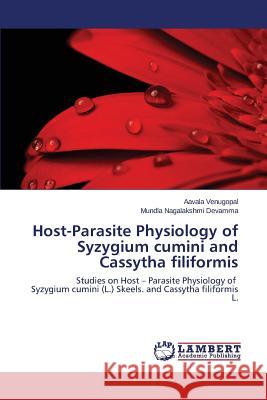Host-Parasite Physiology of Syzygium cumini and Cassytha filiformis » książka
Host-Parasite Physiology of Syzygium cumini and Cassytha filiformis
ISBN-13: 9783659711459 / Angielski / Miękka / 2015 / 128 str.
Syzygium cumini is an evergreen plant which is originally being grown in forest lands of Indonesia and India. This tree belongs to the family Myrtaceae. All parts of these plants are medicinally useful and it has a long tradition in alternative medicines. In these days herbal medicines are more popular than modern medicine because of their effectiveness, easy availability, low cost and for being comparatively devoid of side effects. In Southern Asia the tree is venerated by Buddhists and it is commonly planted near Hindu temples because it is considered Sacred to Krishna. The leaves and fruits are employed in worship. It is not really fire resistant but fires are rarely intense enough in the stands to produce other than peripheral damage.The genus Cassytha (Lauraceae) is a perennial hemi parasitic vine that attaches to the stems of host plants. This genus is the only parasitic taxon in the Lauraceae, and comprises 23 species in the Old and New World tropics and subtropics. Cassytha is a parasitic plant that grows on the trees or hedges has lost its chlorophyll and leaves during evolution. It derives its nutrition from the host plants.
Syzygium cumini is an evergreen plant which is originally being grown in forest lands of Indonesia and India. This tree belongs to the family Myrtaceae. All parts of these plants are medicinally useful and it has a long tradition in alternative medicines. In these days herbal medicines are more popular than modern medicine because of their effectiveness, easy availability, low cost and for being comparatively devoid of side effects. In Southern Asia the tree is venerated by Buddhists and it is commonly planted near Hindu temples because it is considered Sacred to Krishna. The leaves and fruits are employed in worship. It is not really fire resistant but fires are rarely intense enough in the stands to produce other than peripheral damage.The genus Cassytha (Lauraceae) is a perennial hemi parasitic vine that attaches to the stems of host plants. This genus is the only parasitic taxon in the Lauraceae, and comprises 23 species in the Old and New World tropics and subtropics. Cassytha is a parasitic plant that grows on the trees or hedges has lost its chlorophyll and leaves during evolution. It derives its nutrition from the host plants.











